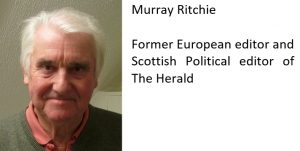Murray Ritchie poses the question: Is the age of Tory England and SNP Scotland finally slipping away?
In Scotland the Scottish National Party suspected they were in for a drubbing in the Rutherglen and Hamilton West by-election and so it proved. Labour, the Nationalists’ mortal enemy, swept to an easy victory on a low turnout and promptly claimed they were now ready to topple the common enemy, the UK Conservatives, in Westminster, when the general election comes along next year.
Sir Keir Starmer, the risk-averse Labour leader, knew he had to win this one. For a generation Labour in Scotland has been eclipsed by the SNP. Until Rutherglen Labour held only one Scottish seat. The party’s jubilation was justified but also a reminder that its total Scottish representation had doubled to only a rather pathetic two. No longer can the SNP claim Scotland has more pandas than Labour MPs.
Pollsters promptly read into the result a prediction that Labour would go back to its old ways by winning a majority of Scotland’s 59 seats, perhaps 40 – widely seen as key to a majority in Westminster, the national seat of power.
They could be right despite the dangers of reading too much into one result on a measly turnout in a seat with exceptional local difficulties for the Nationalists (their disgraced MP was unseated in a recall petition after brazenly breaking Covid rules).
But a win is a win and there can be no gainsaying that the SNP are deeply embarrassed and now terrified of what might await them. Their fear is heightened by the continuing travails of Nicola Sturgeon, former first minister and now a fallen star, currently being investigated by the police in connection with financial scandal in her party.
But what if she is found to have done nothing wrong, as she repeatedly insists? The SNP will be praying that the two-year investigation into her activities produces no charges – except perhaps widespread protest at the way she has been humiliated by the prosecuting authorities. If she goes on trial, however, that will be a different story and the last thing the SNP need.
Meanwhile in England the Tories are desperately abandoning cherished policies to suit the moment. That is what British Tories always do when they are in desperate trouble and explains why they are the most successful electoral survivors in European politics. They are an exceptionally difficult political force to overcome.
Their long-standing commitment to a high-speed rail link from affluent London to the struggling north of England – so-called levelling up – has been curtailed. They don’t have the money. The required billions of pounds are simply not there in today’s broken Britain. Instead the Tories now promise lavish transfers of money from savings in abandoned high speed rail investment to poorer areas. But they are short on specifics.
Similarly Brexit continues to torture Britain and the Tories who lumbered the country with it. Immigration is increasingly figuring in extremist rhetoric by senior Tory ministers and the Brexiteers’ long promised improved border security is now a joke. Nothing has been done to resolve Brexit’s damage to governance in Norther Ireland.
In the English polls the Tories are miles behind Labour while in Scotland Labour are fast catching the SNP. And if you think the SNP now have an understandable by-election aversion it is nothing compared with the Tories in England where huge majorities have been overturned recently – and more such tests are to come in the near future.
Latest YouGov Westminster voting intention (11-12 Oct)
— YouGov (@YouGov) October 13, 2023
Con: 24 (no change from 4-5 Oct)
Lab: 47% (+2)
Lib Dem: 9% (-2)
Reform UK: 8% (=)
Green: 6% (-1)
SNP: 4% (=)https://t.co/SB5X5Uon8i pic.twitter.com/AOSxIz9z1J
In the most recent YouGov poll the Tories trailed Labour by 23 points which would suggest electoral doom for Rishi Sunak, the beleaguered UK prime minister. In the finest tradition of Tory tactical sleight of hand, he is busy re-inventing himself as the prophet of change. But he has a job on his hands to persuade disillusioned voters.
In Scotland the SNP still lead Labour and, as ever, are sustained to a significant extent by support for independence which remains stubbornly healthy. The latest poll by the Tony Blair Institute put it at 45 per cent in favour with those opposed at 41 per cent. Just how much this will matter to the SNP in a general election is an endless debating point but can hardly harm the Nationalist cause.
Nationalists cling to the possibility of replacing unpopular Tories at the next election to make up for some potential losses to Labour. Scotland has six Tory MPs and current polling suggests they could all disappear. But that’s an old story. Polls said such a disaster was possible last time and were wrong.
In these troubled times the Nationalists are facing a potentially difficult fight for the first time in many years.
They might reflect on the words of Scotland’s national bard, Robert Burns,
An’ forward tho’ I canna see,
I guess an’ fear!
Editor’s note: The very best of wishes to Murray on his retirement from Chief-Exec.com. It has been a pleasure to work with such a gifted political journalist and wonderful collaborator.





